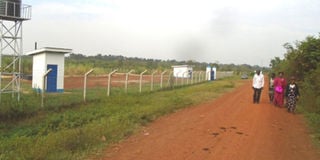Kayunga council, residents split on town building plans

Residents pass by the idle faecal sludge facility in Bukolooto Village, Kayunga District. PHOTO BY FRED MUZAALE
What you need to know:
- On average, a water-borne sanitation facility can cost Shs4m, according to Mr Paul Luboya, a water engineer in charge of Ntenjeru County
- Mr Livingstone Kyagaba, the Kayunga North Village chairperson, says the directive would in a way affect the town’s development as locals who lack enough money would be discouraged from building
Kayunga- Kayunga Town Council has vowed to reject any building plans where developers lack water-borne sanitation facilities.
This implies that for developers who plan to use only the traditional pit-latrines on their buildings, their plans will not be considered.
Kayunga Town Clerk, Ms Margaret Nansubuga, says council passed the resolution in order to enable the town to conform and upgrade to the level of urban areas.
She says the move would also allow the recently constructed faecal sludge management facility for the town, which now lies idle, to operate.
The Ministry of Water and Environment under water and sanitation development facility recently constructed a Shs1.1b faecal management facility for Kayunga Town which currently boasts of about 25,000 residents.
However, the facility in Bukolooto Village, a suburb of Kayunga Town, has been lying idle as very few households in the town have water-borne sanitation facilities.
“We have been having a big challenge, where pit-latrines get filled up and residents have to incur a lot of costs to get trucks from Jinja or Kampala to empty them,” Ms Nansubuga says, adding: “We have no option but to enforce the directive, which we hope would encourage locals to construct water-borne facilities.”
Kayunga Town mayor, Magid Nyanzi, says construction of sewer lines that would take the sewage to the faecal sludge facility would start soon.
However, a section of residents in Kayunga Town have vowed to defy the directive, claiming that they do not have the required money to enable them put in place water-borne sanitation facilities in their houses.
Costs
“The town council came up with this plan without putting due consideration to our income. How many can afford construction of such facilities in this town?” Mr Tom Maliki asks.
“We shall defy this move. They should not force people to construct sanitation facilities they cannot afford,” Mr Maliki says.
On average, a water-borne sanitation facility can cost Shs4m, according to Mr Paul Luboya, a water engineer in charge of Ntenjeru County.
Mr Luboya says this cost (Shs4m) would cover purchasing a water tank, digging a soak pit, putting in place a piped system and others.
Mr Livingstone Kyagaba, the Kayunga North Village chairperson, says the directive would in a way affect the town’s development as locals who lack enough money would be discouraged from building.
This new resolution follows one which was passed last year by the same council, prohibiting construction of none storied building in the town centre.
However, the resolution was rejected by local developers, who continued to construct simple houses in the town.
Corruption cited
The earlier directive is also said to have failed because of alleged corruption among concerned town officials who are said to be bribed and allowed to construct banned structures.
The town clerk, however, denies all these allegations.
Ntenjeru North MP Amos Lugoloobi, says although the resolutions mean that locals have to dig deep into their pockets, they are inevitable if the area is to develop.
He instead advises residents to ask for more time to reorganise themselves and put up structures that meet the required standards rather than opposing the initiatives.


